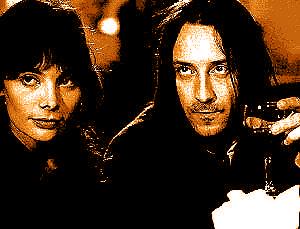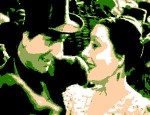Film Review

The film is essentially a typical mid-1990s French romantic comedy, rather lacking on substance, being rather overly reliant on the talent and charisma of its cast.
The popularity of the film in France resulted in a mini-series being commissioned for French television in 1998. This starred some of the actors who appeared in the original film, noticable absences being, alas, Jean-Hugues Anglade and Jacqueline Bisset.
© James Travers 1999
The above content is owned by frenchfilms.org and must not be copied.
Film Synopsis
One year, Léo Klein decides to spend the Christmas holidays at his chalet in the Alps with his two sons, Max and Simon, along with their wives Marie-Claire and Frédérique, and their children. The family get-together turns out to be a pretext for Léo to announce that he has just got married - to Françoise. As one couple set out on a new life together, another - Max and his wife - look as if they are heading for the divorce courts. Marie-Claire has come to resent her husband's frequent absences from home (owing to his work as a filmmaker) and is convinced their marriage is over. If they divorce, she is adamant she will have sole custody of their daughter Lola. Meanwhile, the couple's eldest daughter, Samantha, is old enough to look after herself, and is easily seduced by Alfred, Simon's flirtatious son.As he does every year, the family friend Stéphane shows up to present his latest fiancée, although this time it looks as if his bride-to-be, Lucie, may actually end up with a wedding ring on her finger. Frédérique is scandalised when she catches her husband Simon in a hotel bedroom with a supposed female friend, Judith. The couple soon patch up their differences - well, they have been together 25 years. Things are not looking so rosy for Max and Marie-Claire, particularly after the latter sees her husband making overtures to a younger woman, Anna. This is just the excuse Marie-Claire needs for a bitter outburst of recriminations. When Lucie suddenly goes missing without warning Stéphane fears the worst: her love for him has driven her to suicide! There are plenty more twists and turns in store before the holiday is over and the neurotic holidaymakers can make their way back to Paris...
© James Travers
The above content is owned by frenchfilms.org and must not be copied.
Similar Films
Here are some other films you may enjoy watching:- Smoking / No Smoking (1993)
- Ils se marièrent et eurent beaucoup d'enfants (2004)
- Trois couleurs: Blanc (1994)
- Fauteuils d'orchestre (2006)
- My Beautiful Laundrette (1985)
Other related links:
Film Credits
- Director: Élie Chouraqui
- Script: Élie Chouraqui, Danièle Thompson
- Cinematographer: Robert Alazraki
- Music: Gabriel Yared
- Cast: Jean-Hugues Anglade (Stéphane), Jacqueline Bisset (Frédérique), Christine Boisson (Marie-Claire), André Dussollier (Simon), Gérard Lanvin (Max), Marie Trintignant (Lucie), Anouk Aimée (Françoise), Daniel Gélin (Léo), Anne Roussel (Anna), Christian Charmetant (Antoine), Christopher Thompson (Alfred), Virginie Ledoyen (Samantha), Patricia Malvoisin (Judith), Nita Klein (Denise), Julia Maraval (Lola), Yves Gavard (Schlomo), Edith Vernes (La manucure), Pierre-Yves Gallenne (M. Toumine), Dany Gallenne (Mme Toumine), Elodie Tairraz (Charlotte)
- Country: France
- Language: French
- Support: Color
- Runtime: 104 min
The very best French thrillers

The greatest French Films of all time

The best of Indian cinema
